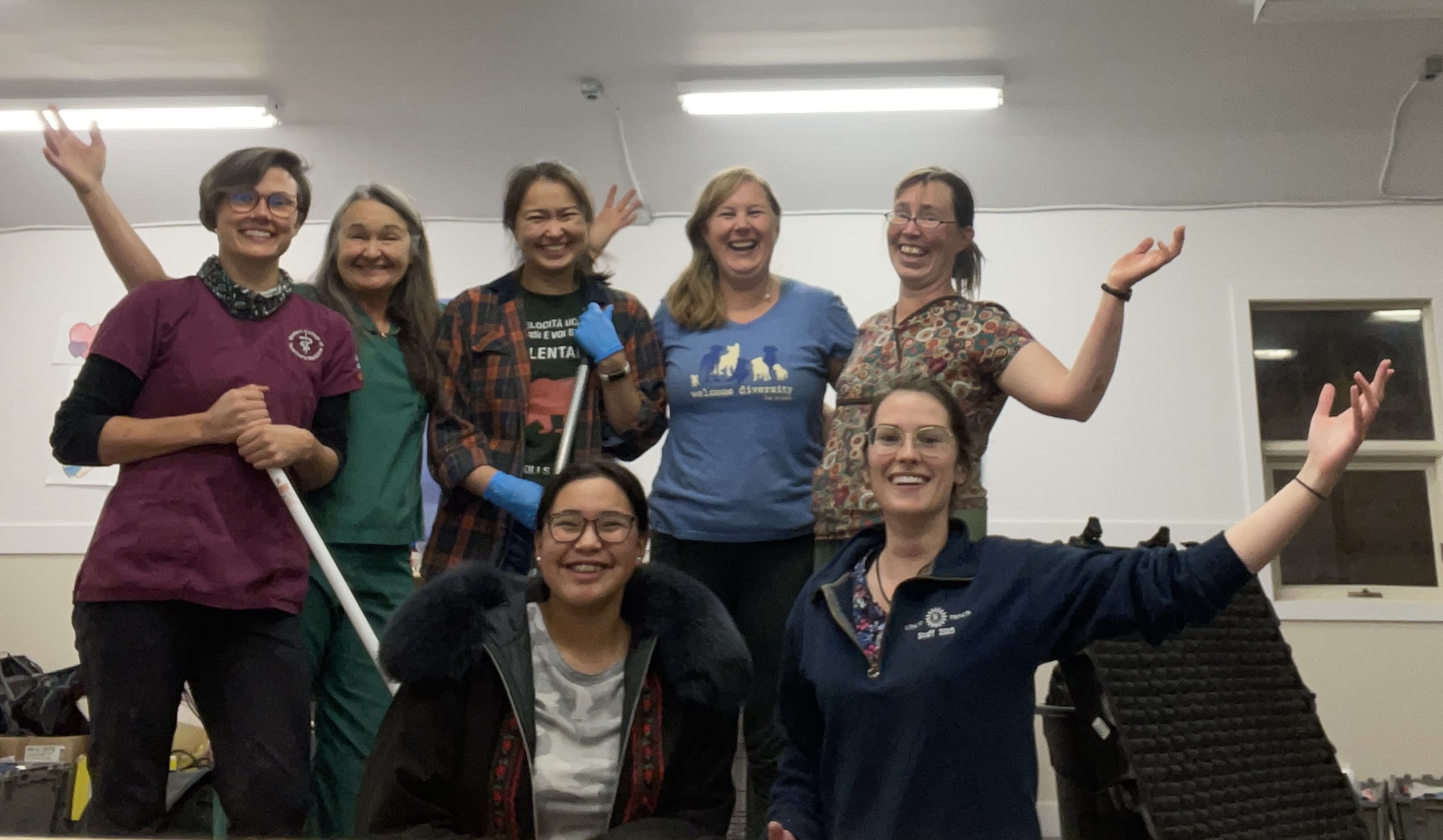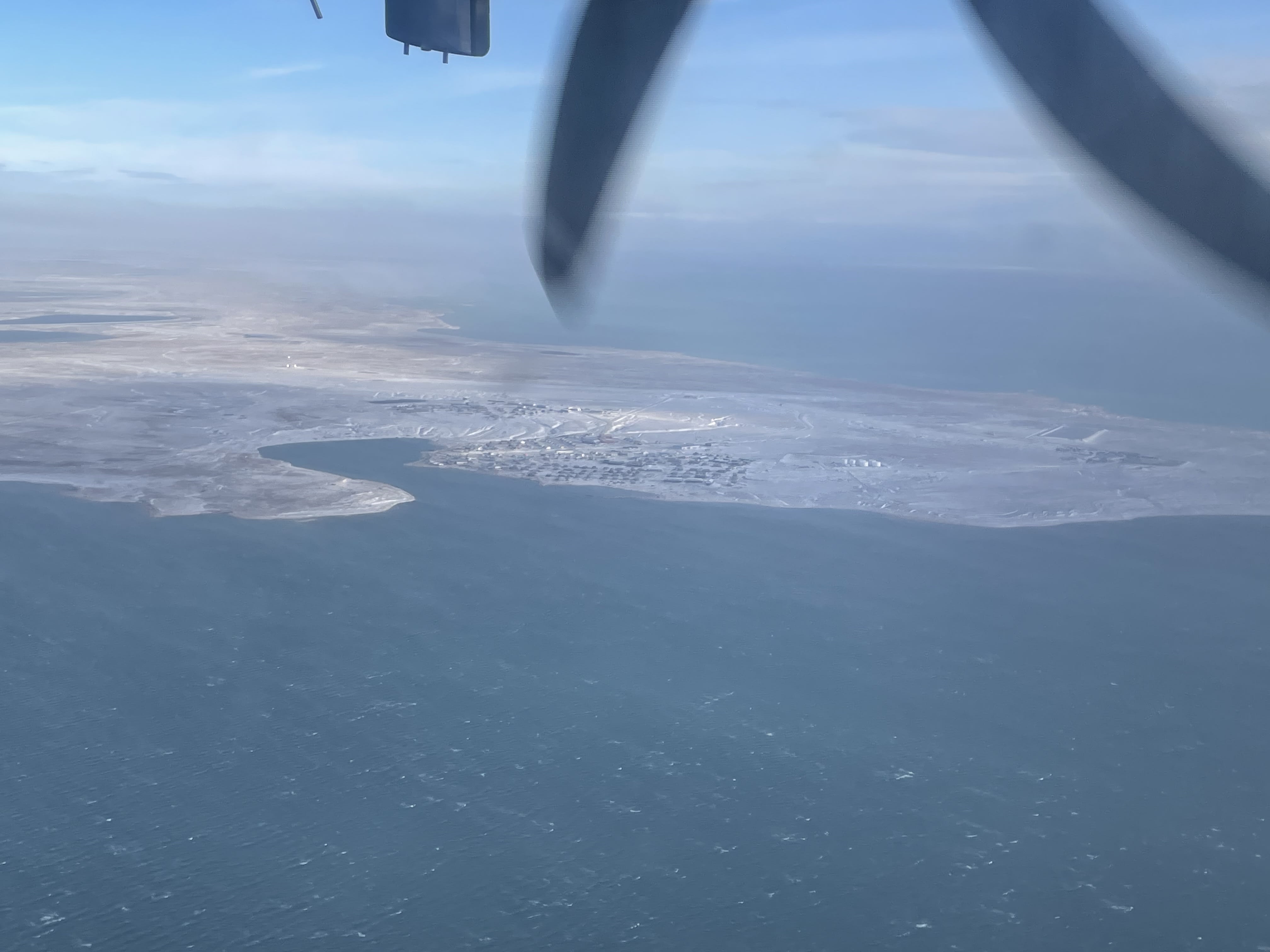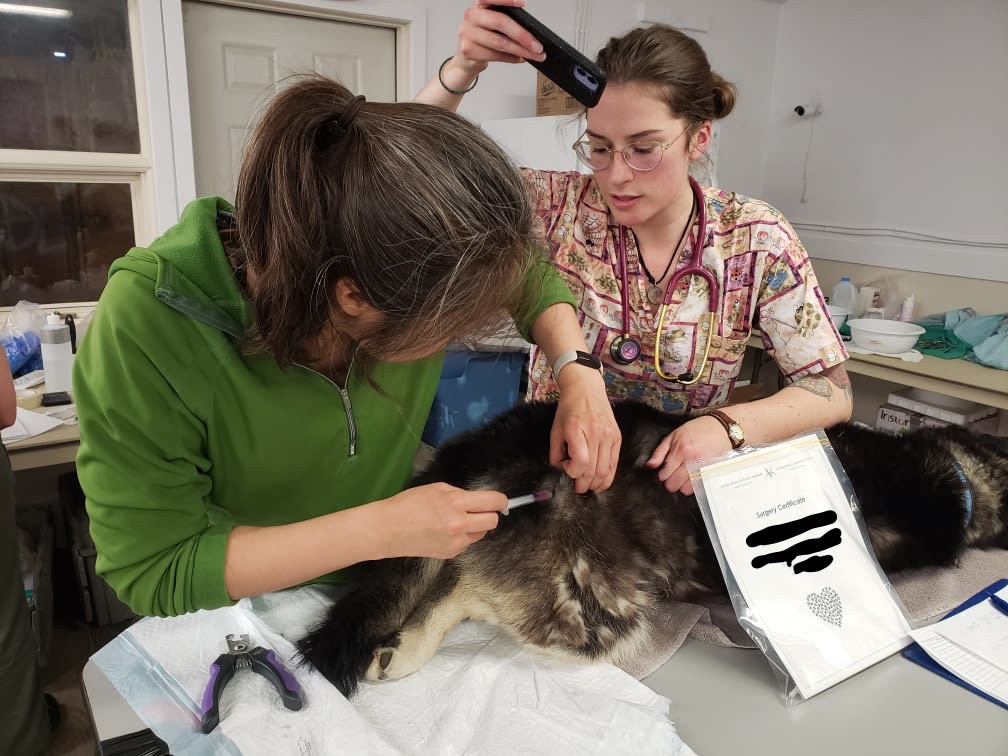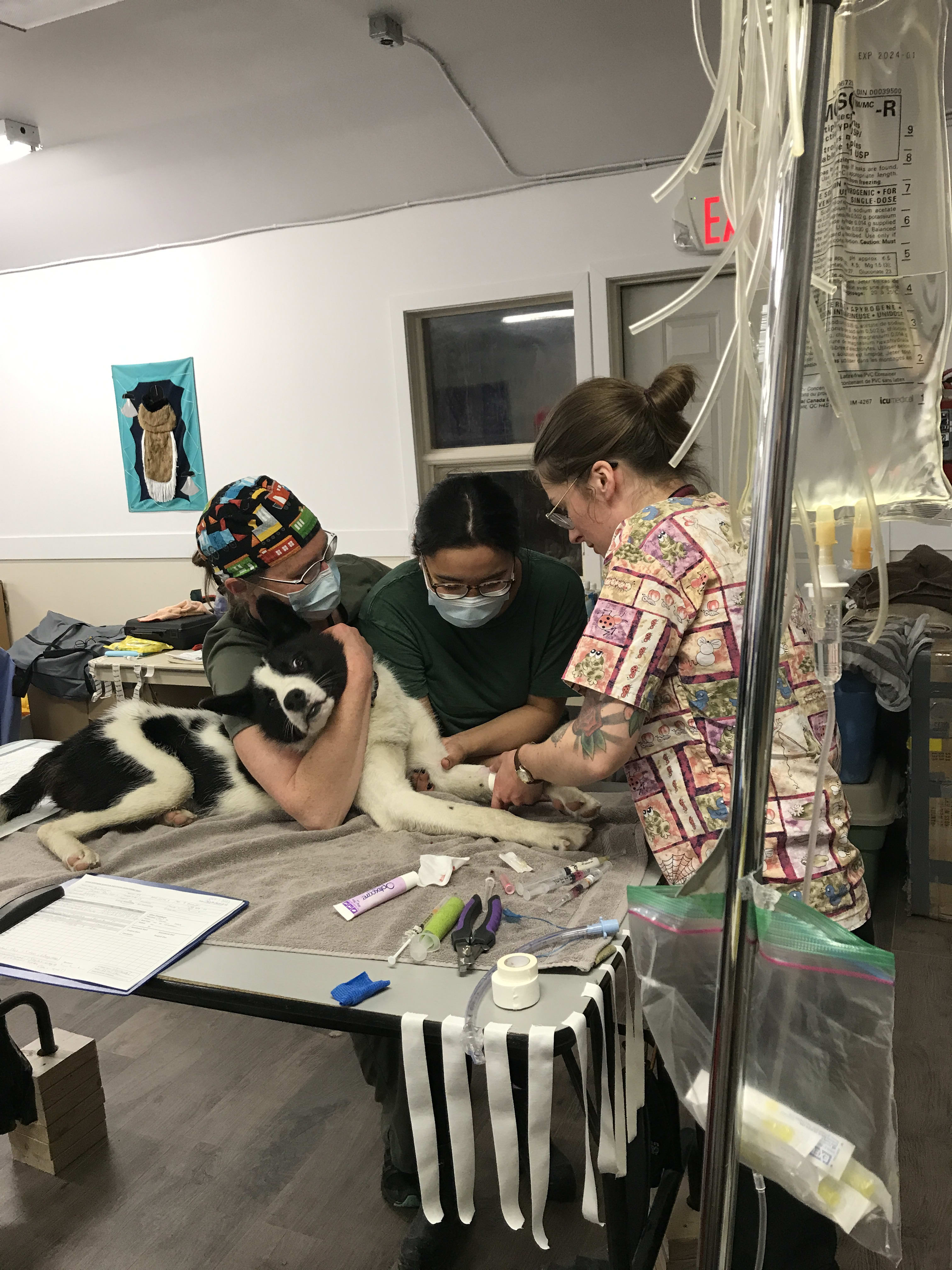This blog was contributed by Julie Kerr, a VWB/VSF NAHI volunteer.
“Thank you for treating our dogs.” These were crayon words on a child’s drawing – itself a keen representation of the veterinary clinic in Taloyoak, NU. One drawing amongst several that clinic participants, Tiffany and Rosemary, delivered to us after their grade five class visited the Veterinarians Without Borders/Vétérinaires Sans Frontières Canada (VWB/VSF) clinic earlier that day. Words to fill my heart with gladness.

The "packing up Gjoa Haven vet clinic selfie". VWB team and Gjoa Haven volunteers, L to R (back) Lauren, Veronica, Assol, Marieke, Julie, (front) Aliyah and Jordan.
There are many reasons why I chose to volunteer with VWB/VSF during their fall Northern Animal Health Initiative clinics. But, the opportunity for teaching was one of my main motivations. VWB/VSF’s education mandate lived up to my expectations in the hamlets of Gjoa Haven and Taloyoak. (In case you haven’t yet realized, I thoroughly enjoy teaching).
For me, there were a lot of firsts on this trip — first time volunteering with a spay/neuter clinic, first time setting up a vet clinic from zero to full surgical suite, first time so far north, first time at a fly-in only community, first time touching both the Arctic Ocean and Great Slave Lake.
Immediately, upon our arrival, the vet clinic in Gjoa Haven seemed quite busy. I'm not sure about the exact numbers of animals who received exams, who we then dewormed, vaccinated, and/or provided spays or neuters for. What I can speak to is that our clinic days were busy, yet the entire team made it a daily priority to slow down our work flow enough to teach every person who came through the door and was interested in learning, (which I think was everyone!). What a pleasure to share the craft of veterinary medicine. It was an inspiration every day to observe the teachings of my fellow volunteers – Veronica, Lauren, and Jordan, as well as VWB/VSF’s Marieke.
In addition to the curiosity of clients in general, teaching in Gjoa Haven was significant to me for two other reasons. These included working with Assol Kubeisinova, who is training to be the Community Lay Vaccinator, and Aliyah, a high school student considering veterinary medicine as a future career Both women volunteered every day alongside our team to gain and practice skills. To watch them both work on their vaccination skillsets and holding techniques for IV placement and intubation, and build confidence based on their hard work, was exceptionally fulfilling. Their time spent volunteering every day was also instrumental to the success of our team, and kept our clinic working like a well-oiled machine. Many thanks to them both!

Flying over the Arctic Ocean, preparing to land in Gjoa Haven.
Due to a weather delay, which affected our flight plans, we arrived 24 hours later than expected in Gjoa Haven. This meant we missed a planned school group tour and opportunity to teach the classes. I will not lie; I was quite disappointed. But, flying in low over the Arctic Ocean, coming in to land in Gjoa Haven, located on King William Island, I could see the point of waiting for the better weather. And, while we did miss the organized school tours, the teachers encouraged the kids to drop by the clinic while we were there – and many did! Some of my best memories of Gjoa Haven were the children visiting the clinic who observed, listened, and asked questions. Memories like watching their eyes light up when they listened to an anesthetized dog’s heart beat through my stethoscope, having a group of children in a semi-circle around me, watching for the swallow reflex so I could extubate my post-surgical patient, and explaining why we placed a breathing tube in the first place. I will not forget these moments, nor will I forget watching my fellow volunteers doing their own teaching, often to the question of “what is THAT?”
On our flight day to travel from Gjoa Haven to Taloyoak, clouds were low, visibility poor, and we did our final-pack of the vet clinic not knowing if we were going to be flying that afternoon. We were mildly delayed, but the clouds finally lifted enough for us to fly out of Gjoa Haven. We had one planned stop enroute, in Kugaaruk. That was my first experience nearly landing, but instead having to pull up in a steep ascent to circle for another try from the other end of the runway. Pilots familiar with local conditions are good at their craft, and we successfully landed in Kugaaruk as well as Taloyoak — thank you weather for co-operating and pilots for your skill(s)! We made it; though one of our anesthetic machines accidentally remained in Gjoa Haven. While some of our group dealt with that reality, others went and unloaded supplies at the rec centre (soon to be a vet clinic!). Jerome, one of our local contacts, and Ashton and Robert, two young men working at the rec centre, pitched in to help us unload, which was greatly appreciated. We then received news that the anesthetic machine would arrive the following afternoon.
 Jordan and I teaching Aliyah and Assol a variety of skills, and giving them space to practice. (Photo 1)
Jordan and I teaching Aliyah and Assol a variety of skills, and giving them space to practice. (Photo 1)
Of course, if everything ran smoothly all the time, life would be boring, so we adapted our morning to set up the vet clinic and started afternoon surgeries with the one anesthetic machine we did have. We were slowed down, but still operational. Less children dropped by on their own initiative in Taloyoak, but we did have two planned school visits; first with the kindergarten, then the grade five classes. The kindergarten class was very interested in seeing our patients, learning their names, and listening to stories. I read them the VWB/VSF book called "Kindness Is", and a more rapt audience I have rarely had. This reading became an engaged and interactive group discussion, as per the book subject, on what kindness to animals might look like. Five-year-old's are darned smart, that’s my take away. The grade five class was willing to volunteer for any task, and had more questions about the surgeries and surgery prep in general, vaccines, veterinary careers, and, based on the drawings we later received, clearly taking in every detail on how to run a vet clinic. One boy’s dogs were in clinic that day, and both he and his classmates had many questions specifically on the care his dogs were receiving. Then, just as the class was leaving, the kids discovered the snack table and I found myself in the hilariously unexpected position of running interference between adolescents’ and veterinary colleagues’ appetites. Sharing cookies, whew, a whirlwind and wonderful times!
To everyone who came to help, to observe, to learn, to ask, I want to say thank you. In Gjoa Haven, our community contact, Stephanie Autut, who co-ordinated the Gjoa Haven clinic and the excellent homemade meals in our freezer made by community members; Jimiree, who assisted loading and unloading our packed clinic for the airport, (along with your cohort, whose name I never heard, as I was too busy listening to your descriptions of bird migration routes in the fall); Deacon and those delicious, large homemade cookies; Nevaeh, Trinity, Camille, Charmaine, Jake with Booth; Assol and Aliyah for everything you do. To the Canadian North employee, (whose dog had been one of our patients, and whose name escapes my memory though I can still see his face), on the tarmac in Gjoa Haven who gave the veterinary team individual fist bumps and thank you’s as we boarded for Taloyoak. In Taloyoak, our community contact, Johna Johnson (JJ), and Peter for the coffee every morning, the delivered breakfast snacks, (you make an excellent bread pudding!), and a wonderful meal in your home; Lenny, for working to keep the rec centre building a comfortable temperature for our patients and excellent conversations; the kindergarten and grade five classes; Ashton, Robert, and Jerome who, amongst them, unloaded the clinic for us, facilitated our grocery shopping endeavours upon arrival, and who worked hard to teach me the correct pronunciation of "Taloyoak", through their laughter. The entire experience is a sum of moments including these; a collection of parts I am still processing.
 Jordan and I teaching Aliyah and Assol a variety of skills, and giving them space to practice. (Photo 2)
Jordan and I teaching Aliyah and Assol a variety of skills, and giving them space to practice. (Photo 2)
Finally, it struck me how frequently a northern thread existed between myself and many people I met. When I look on a map, Whitehorse, Yukon is far southwest of both Gjoa Haven and Taloyoak, and yet, when we got talking, many people told me stories of visiting Whitehorse. This reminded me, once again, of two things: how interconnected the North is, and what a very small world it can be. Due to the busy nature of the clinics, I suspect I have forgotten so many names in my mind, but not in my heart. The memory of working with you and our conversations will remain long in my memory, as will the landscape of Nunavut. Thank you to both Gjoa Haven and Taloyoak for making us so welcome during our time in your hamlets. Lastly, to the team of volunteers with whom I worked through all these moments, thank you from the bottom of my heart for all you do and who you are.
Interested in learning more about our NAHI work or volunteering? Click here.




